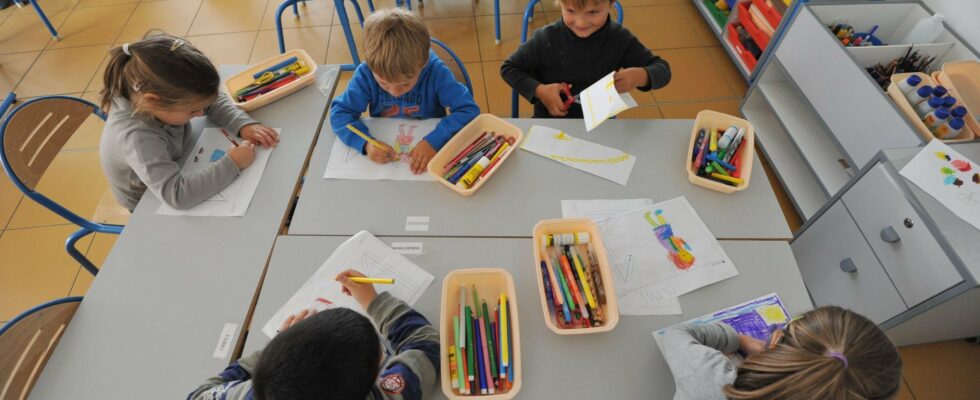National Education was to be the government’s “absolute priority”. However, the 2025 finance bill, presented on October 10 to the Council of Ministers, provides for the elimination of 4,000 teaching positions. The first level (schools) is the most affected with a drop of 3,155 positions in the public sector and 660 positions in the private sector under contract. While secondary education (middle and high schools) loses 180 positions in the public sector and 40 in the private sector under contract. The FSU-SNUipp, the main primary school teachers’ union, immediately expressed its “anger” and “dismay” at what it considers to be a “scuttle of public schools”. “While all the signals are red and the school has already reached a breaking point, the government’s first measure is to impose a further reduction in resources,” she denounced on October 11 in a press release.
For the Minister of the Budget, Laurent Saint-Martin, it would be completely false to say that National Education is preparing to undergo an “austerity cure”. The tenant of Bercy ensures that the drop in teaching numbers will be compensated by the current demographic decline. “At the start of the 2025 school year, it is estimated that there will be approximately 100,000 fewer students. What is good management of taxpayers’ money? Is it considering that a budget of a ministry must be systematically increasing both in resources and in staff, or is it that of adapting to the reality of the need of the public service? “, he declared on Friday October 11 on RTL. And the minister added: “We are going to strengthen the presence in front of the students of the number of teachers according to the reality of the number of students […] In other words, the supervision rate will increase.”
Baptiste Larseneur, associate education expert at the Institut Montaigne, understands the government’s logic but insists on the need to continue the efforts made at primary level.
L’Express: Does the reduction in the number of teaching positions planned by the government seem justified to you?
Baptiste Larseneur: The government justifies its decision to reduce the number of teaching positions, mainly in primary schools, by highlighting the current and future demographic decline. It is true that, since 2016, the number of students has decreased in primary education and that this curve will continue to decline. It must also be recognized that, since the start of Emmanuel Macron’s first five-year term, an ambitious policy has been pursued in favor of primary schools. This resulted in the creation of 20,000 additional jobs between 2017 and 2024, mainly linked to the splitting of classes in REP and REP + carried out in the main nursery section, in CP and in CE1. The State has also kept its commitment to cap enrollment at 24 students per class. All this represented around a billion investment per year, a substantial part of the evolution of the National Education budget.
I think these efforts must be continued. It seems particularly important to me to protect the splitting of classes in priority networks because this reform, launched when Jean-Michel Blanquer was minister, is starting to bear fruit. As of 2021, the results of the international PIRLS survey showed slight progress among CM1 students in reading comprehension. Which clearly proves that it is possible to improve performance in a very short time.
But don’t the announced budgetary choices risk putting an end to this priority granted so far to primary education?
Yes, and that’s the problem. Let us remember that all the countries which have sought to improve their educational performance have placed massive emphasis on primary education. France, even if it has made progress, still falls short of many other states: the investment it devotes to kindergarten is 12% lower than other OECD countries (and 38% lower). if we compare to Finland which remains a reference). In elementary, it is 7% lower. The policy announced by the Barnier government puts an end to this commitment which had been made when, on the contrary, we should continue the efforts begun. Because it is in the lower classes that educational inequalities appear and we know well that these are very difficult to stop later. No doubt it would have been more judicious to try to make savings on the second degree in which, moreover, France invests much more. In secondary education, spending per student is 18% higher than in other OECD countries. We could, for example, reduce the number of options offered or encourage the versatility of teachers, by encouraging them to teach several subjects. But these developments are quite difficult to implement.
The government insists that the Education budget, set at 63 billion euros, will increase very slightly. Is this really good news?
Here again, it is appropriate to look at the evolution of recent years. Between 2017 and 2025, the budget devoted to Education increased by 14 billion. Which is a significant effort. Knowing that between 2012 and 2017, it had only been increased by an additional 4 billion and that between 2007 and 2012 it had fallen by 0.3 billion. But the budget which has just been announced puts an end to this proactive policy. Especially since it is very likely that the budget will be stabilized in the coming years and will therefore no longer increase. I emphasize that these announced reductions in positions, which are expected to increase in the future in secondary education due to the continued demographic decline, seem to me to send a very bad signal to those who would consider becoming teachers. This is not how we will solve the problem of the decline in attractiveness of the profession.
.
